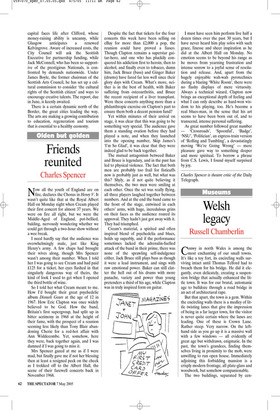Friends reunited
Charles Spencer
Now all the youth of England are on fire, declares the Chorus in Henry V. It wasn’t quite like that at the Royal Albert Hall on Monday night when Cream played their first concert for almost 37 years. We were on fire all right, but we were the Middle-Aged of England, pot-bellied, balding, nervously wondering whether we could get through a two-hour show without a wee break.
I need hardly say that the audience was overwhelmingly male, just like King Henry’s army. A few chaps had brought their wives along, though Mrs Spencer wasn’t among their number. When I told her I was going to see Cream and had paid £125 for a ticket, her eyes flashed in that singularly dangerous way of theirs, the kind of look I used to get when I opened the third bottle of wine.
So I told her what Cream meant to me. How I’d bought their great psychedelic album Disraeli Gears at the age of 12 in 1967. How Eric Clapton was once widely believed to be God. How the band, Britain’s first supergroup, had split up in bitter acrimony in 1968 at the height of their fame, with the prospect of a reunion seeming less likely than Tony Blair abandoning Cherie for a red-hot affair with Ann Widdecombe. Yet, somehow, here they were, back together again, and I was damned if I was going to miss it.
Mrs Spencer gazed at me as if I were mad, but finally gave me if not her blessing then at least a resigned peck on the cheek as I trekked off to the Albert Hall, the scene of their farewell concerts back in November 1968. Despite the fact that tickets for the four concerts this week have been selling on eBay for more than £2,000 a pop, the reunion could have proved a fiasco. Though Clapton remains a superstar guitar-hero, and one who has pluckily conquered his addiction first to heroin, then to alcohol, and finally even to tobacco, damn him, Jack Bruce (bass) and Ginger Baker (drums) have fared far less well since their glory days with Cream. What’s more, neither is in the best of health, with Baker suffering from osteoarthritis, and Bruce the recent recipient of a liver transplant. Were these concerts anything more than a philanthropic exercise on Clapton’s part to ensure them both a decent pension fund?
Yet within minutes of their arrival on stage, it was clear that this was going to be something very special. The audience gave them a standing ovation before they had played a note, and when they launched into the opening number, Skip James’s ‘I’m So Glad’, it was clear that they were indeed glad to be back together.
The mutual antagonism betweed Baker and Bruce is legendary, and in the past has led to physical violence. The fact that both men are probably too frail for fisticuffs now is probably just as well, but what was this? Shyly, as if not quite believing it themselves, the two men were smiling at each other. Once the set was really flying, all three players laughed together between numbers. And at the end the band came to the front of the stage, entwined in each others’ arms, with huge, incredulous grins on their faces as the audience roared its approval. They hadn’t just got away with it. They had triumphed.
Cream’s material, a spirited and often inspired blend of psychedelia and blues, holds up superbly, and if the performance sometimes lacked the adrenalin-fuelled attack of the band in their prime, there was none of the sprawling self-indulgence either. Jack Bruce still plays bass as though it were a lead instrument, and sings with raw emotional power. Baker can still clatter the hell out of his drums with more panache, variety and power than young pretenders a third of his age, while Clapton was in truly inspired form on guitar. I must have seen him perform live half a dozen times over the past 30 years, but I have never heard him play solos with such grace, finesse and sheer inspiration as he did at the Albert Hall on Monday. No emotion seems to be beyond his range as he moves from yearning frustration and intense sorrow to a joyful sense of resolution and release. And, apart from the hugely enjoyable wah-wah pyrotechnics during a blazing ‘White Room’, there were no flashy displays of mere virtuosity. Always a technical wizard, Clapton now brings an exceptional depth of feeling and what I can only describe as hard-won wisdom to his playing, too. He’s become a real blues-man, in the sense that his art seems to have been born out of, and to transcend, intense personal suffering.
As great number followed great number — ‘Crossroads’, ‘Spoonful’, ‘Badge’, ‘NSU’, ‘Politician’, an express-train version of ‘Rolling and Tumbling’, a devastatingly moving ‘We’re Going Wrong’ — mere pleasure gave way to something deeper and more spiritual. To borrow a phrase from C.S. Lewis, I found myself surprised by joy.
Charles Spencer is theatre critic of the Daily Telegraph.



























































 Previous page
Previous page